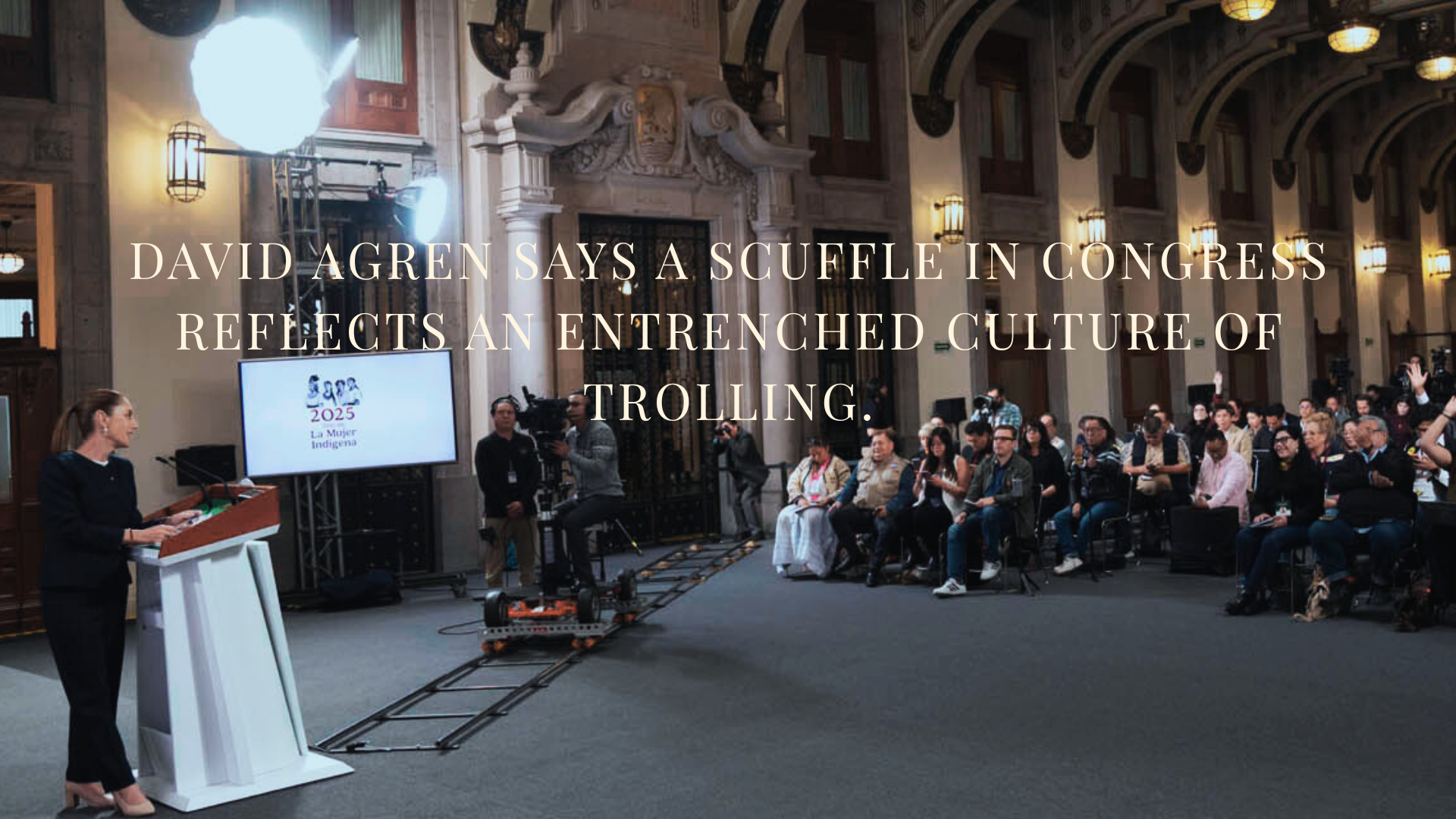
Despite talk of historic cooperation, the divide between Mexico City & DC is deepening
by Luis Rubio, political analyst and Chair of México Evalúa.
Mexico City and Washington are the capitals of two neighboring nations whose interactions are among the most dynamic and complex in the world — yet whose leaderships could hardly be more distant or contrasting. Both countries are about to begin negotiations to review their existing trade agreement, but their perspectives are so different that, if current trends continue, it is hard to imagine a successful outcome.
For nearly two centuries, Mexico and the United States maintained a relationship that fluctuated between closeness and distance, conflict and limited cooperation. The border evolved significantly over time—most notably through Texas’s independence and the U.S. invasion of 1847 — while the Mexican Revolution of 1910 further strained relations as Mexico sought U.S. recognition of the new revolutionary regime. The relationship was functional but tense, full of ups and downs.
In the 1980s, Mexico decided…

Sheinbaum at one year: A ‘complex’ operator emerges
by David Agren, writer-at-large.
President Claudia Sheinbaum swore the oath of office one year ago in a ceremony laden with symbolism as she became Mexico’s first female president. Flanked by female cadets, she took the sash from Infigenia Martínez – a prominent figure on the Mexican left and trailblazer for women in Mexican politics – as lawmakers in the lower house of congress chanted, “¡Presidenta!”
She unveiled the logo for her government, featuring an Indigenous woman. She assumed the presidency with a crushing electoral mandate, capturing more than 60 per cent of the popular vote in the June 2024 election – the highest total since the heyday of Institutional Revolutionary Party (PRI) rule in the 1970s.
But she arrived at the inauguration in the shadow of…


Sheinbaum’s first year has been a contradictory & muddled experiment
Around this time last year I was just arriving back in London, having traveled to Mexico for President Claudia Sheinbaum’s historic inauguration. While I encountered a handful of people already dismissive of Sheinbaum and contemptuous of her MORENA party, most I met were prepared to give the incoming president the benefit of the doubt. Many were hopeful that once in office she would prove as inspirational as the symbolism of her election promised. She had a great deal of political goodwill and capital to burn. One year on, her personal approval continues at stratospheric levels. But her consistently lower numbers on specific policy areas suggest a public aware of the tensions that mark her conflicted and contradictory first year in power.
The conventional wisdom is that on the big ticket items of trade and security Sheinbaum has scored some wins. Her management of the U.S.–Mexico relationship has been cautious but effective. With Donald Trump back in the White House, Mexico’s northern border could have become an economic choke point. Instead, Sheinbaum prioritized the survival of the USMCA, resisting confrontation and avoiding the rhetorical skirmishes her predecessor seemed to relish. In doing so, she not only kept U.S. trade threats at bay but also drew Canada closer as a quiet ally. Marcelo Ebrard has played the role of economic diplomat in chief, constantly negotiating with Washington, reinforcing Mexico’s stance as a stable partner in an era of volatile politics.
Yet a sizeable…
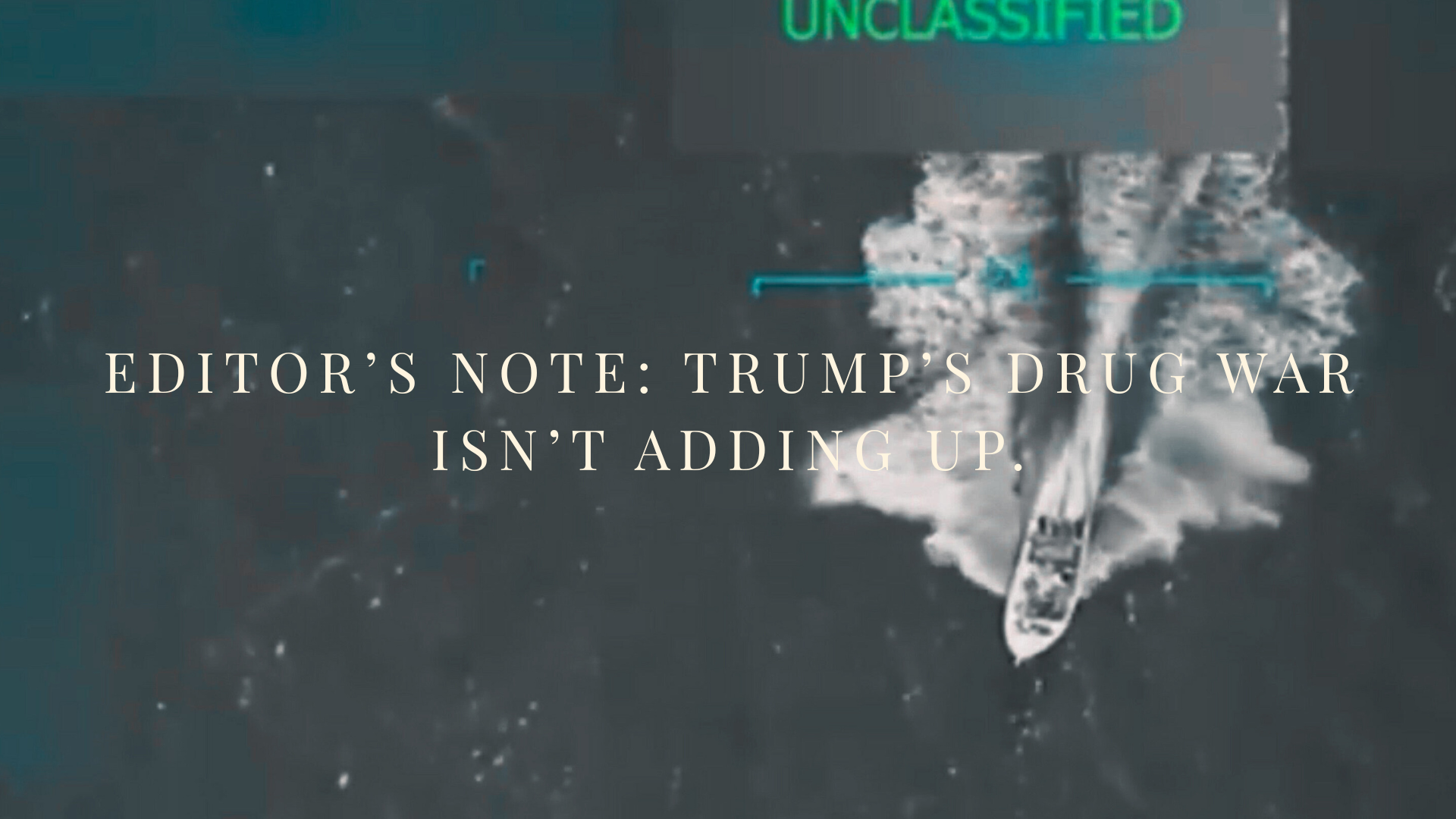
Trump’s drug war isn’t adding up
by Andrew Law, editor and founder.
I want to pause this week to point out an incongruity in the Trump administration’s supposed war on drug trafficking that is posing challenges around how we best cover this key topic. This isn’t my usual kind of column, but I hope you’ll bear with me.
The press — and I think most people generally on both sides of the border — see Trump as having gone hard on traffickers. The militarized southern border, the arm-twisting of Sheinbaum and her MORENA allies, downgrading Colombia, and of course, the bombing of passenger boats in the Caribbean. Last week, I highlighted rumors that the fuel theft scandal engulfing Mexico’s Navy (and discussed in more detail this week by Luis Rubio) is being propelled by leaks out of Washington. It all gives the impression of a major realignment of US security posture. But when you zoom in, it just doesn’t hang together…
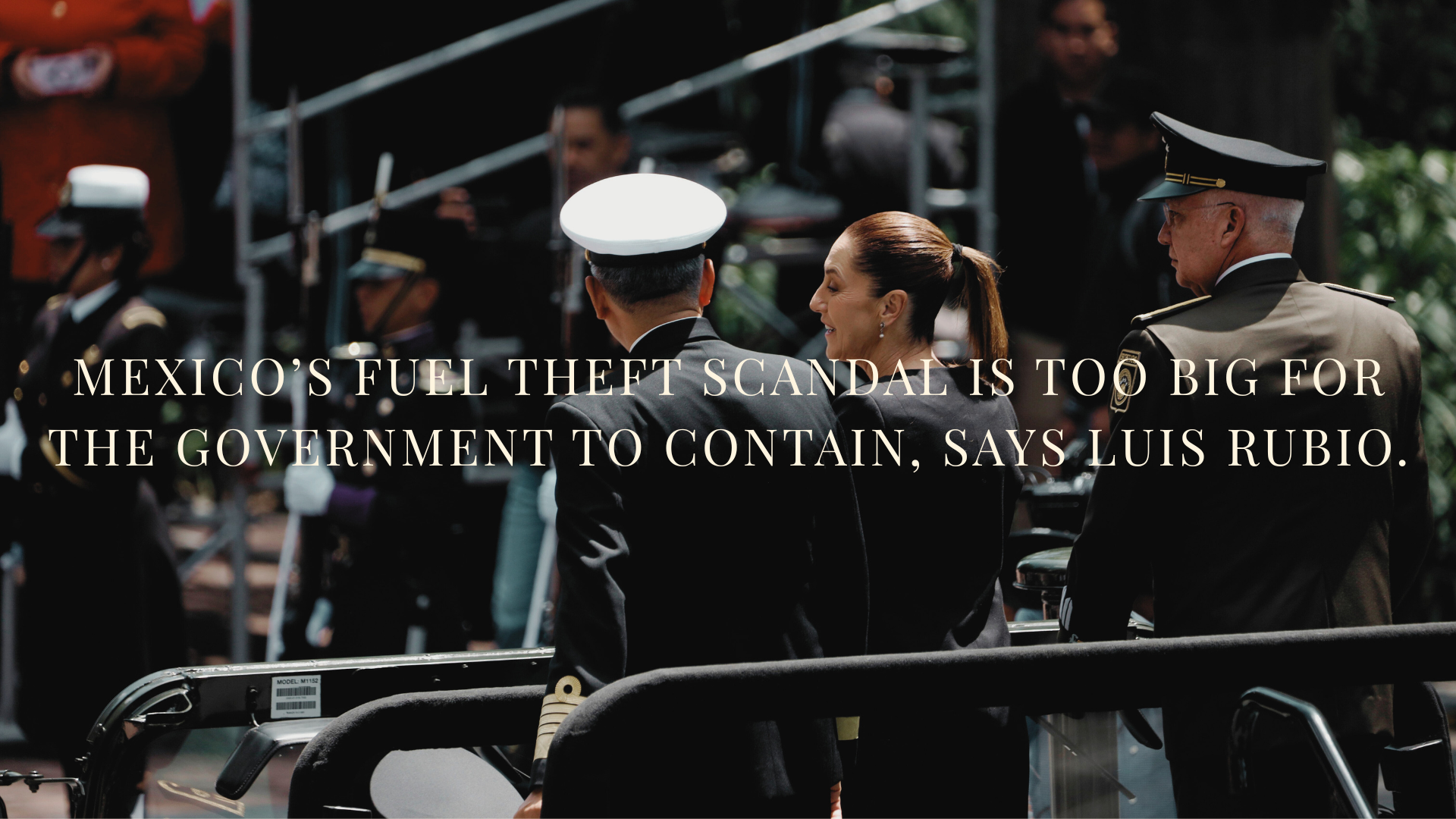
Mexico’s fuel theft scandal is too big for the government to contain
by Luis Rubio.
Gasoline theft is nothing new in Mexico. One need only recall the 1992 Guadalajara explosion, triggered by stolen gasoline dumped into the city’s drainage system after traffickers failed to sell their cargo during Holy Week. That was just the beginning, in fact, child’s play. Since then, two factors have changed: first, the sheer scale of the stolen-fuel market; and second, the deep entanglement between organized crime and government officials. The central question now is whether the sheer magnitude of this scandal—both in financial terms and in the corruption it exposes—will have significant political consequences.
Today, fuel theft in Mexico takes three forms. The first is the direct siphoning of gasoline from Pemex pipelines, most notably in Guanajuato, a hub crisscrossed by pipelines. The second is crude oil theft, followed by clandestine refining. The third, and most lucrative, is so-called tax-huachicol: gasoline imported but disguised on paper as crude oil to avoid paying taxes. A variation of this scheme involves exporting illegally refined gasoline to the United States, also tax-free, a trade with quite different, in fact geopolitical, implications, beyond the obvious criminal ones.
Illegal fuel sales have…

What place does Claudia Sheinbaum want in Mexico’s history?
by Andrew Law, editor and founder.
Mexican President Claudia Sheinbaum became the first woman to deliver the cry of independence from the Presidential Palace this week, coinciding with the 215th anniversary of the nation’s independence. She used the moment to highlight female heroes long excluded from the ritual, remarking that recovering women’s place in Mexico’s history is part of what it means to be the country’s first female president. For generations of girls, she asked, what did it mean to hear only men named as heroes of independence, to never see yourself reflected in the story of your nation?
That a woman was all but guaranteed to win the presidency in last year’s election is a point of pride for a country still marked by machismo and an epidemic of violence against women and girls. This week of all weeks, her symbolism is undeniable, and Sheinbaum was right to recognize her responsibility in correcting the historic record. But one year on, what matters is whether Sheinbaum can turn the fact of being first into a transformative act…
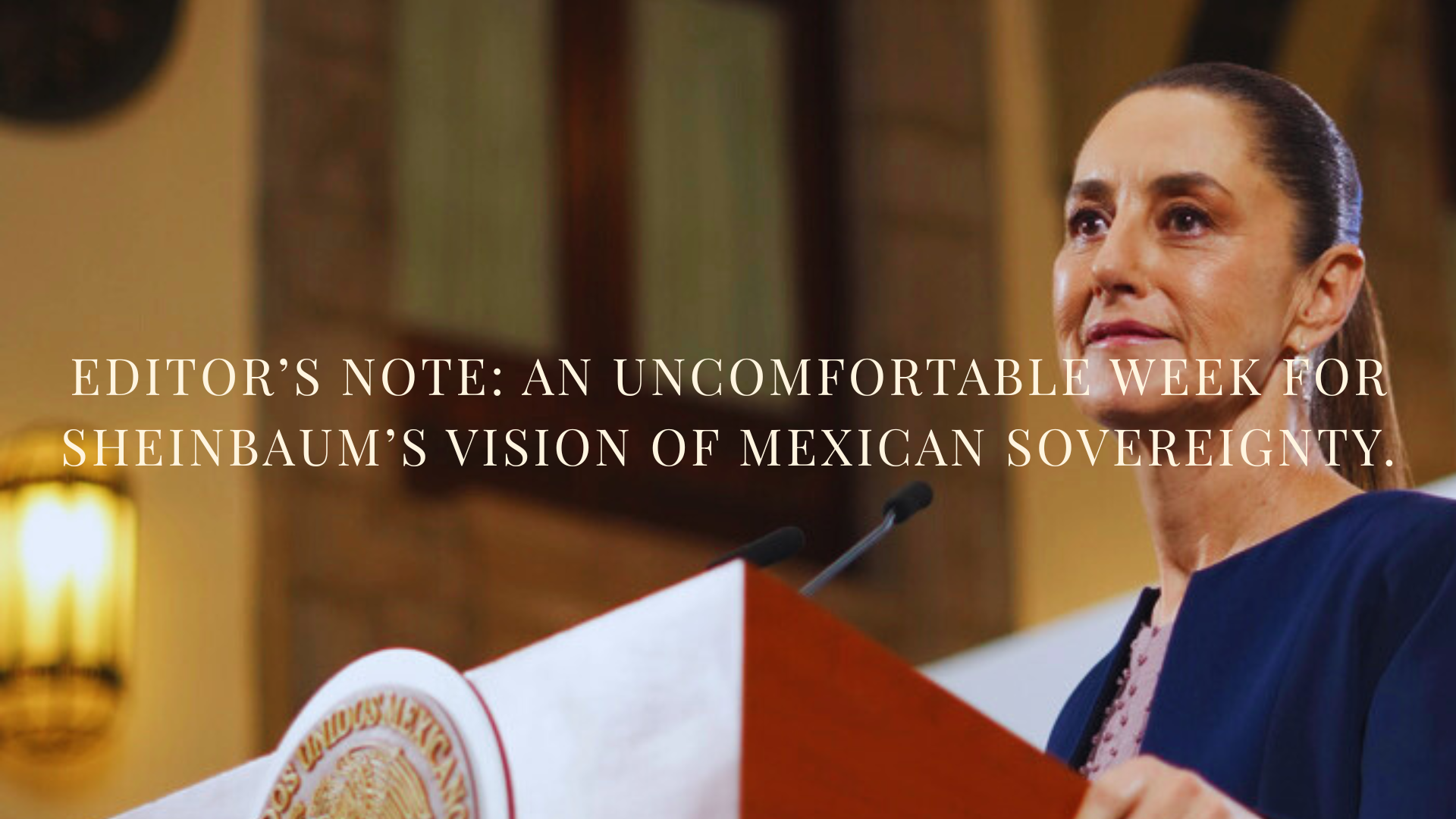
Editor’s note: An uncomfortable week for Sheinbaum’s vision of Mexican sovereignty
by Andrew Law, editor and founder.
This week a video circulated on social media of former Mexican president Felipe Calderón decrying the country’s freshly implemented judicial reform at Georgetown University in Washington, DC.
In it, Calderón called MORENA’s reform a “demolition project” that had likely rendered free elections a thing of the past. What seemed to irritate President Claudia Sheinbaum most, however, was Calderón’s suggestion that former US ambassador Ken Salazar should have intervened. Sheinbaum did not hold back at her morning press conference: “It's outrageous, there's no other word for it. He goes to the United States to say that the American ambassador should have intervened to prevent the judicial reform from passing. Aside from being spurious, he's a traitor.”
Sheinbaum rarely misses a chance to stress Mexico’s sovereignty in her dealings with Washington. When Secretary of State Marco Rubio visited last week to highlight security cooperation, the first line of the joint statement stressed respect for sovereignty, echoing…
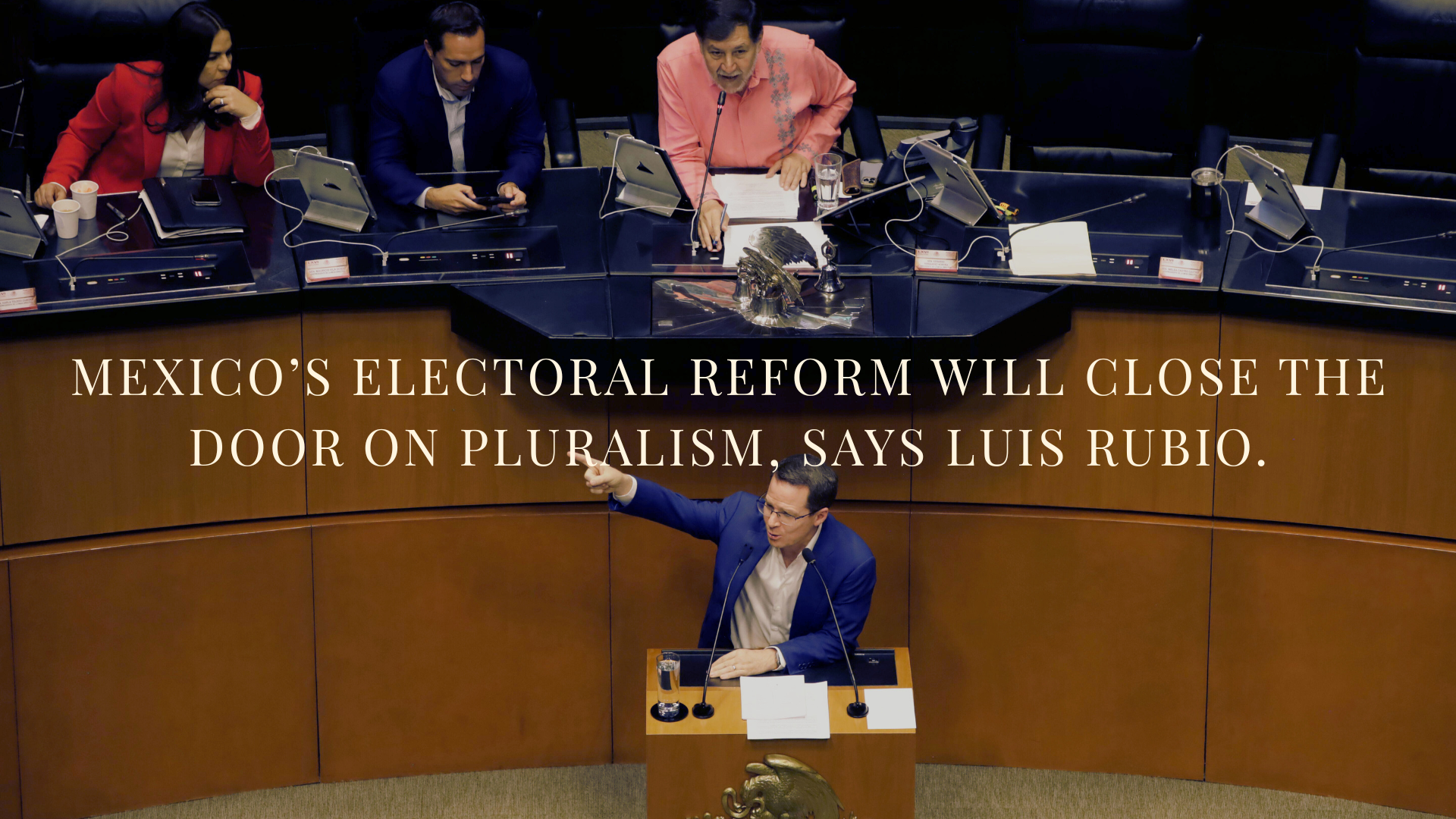
Mexico’s electoral reform will close the door on pluralism
by Luis Rubio, political analyst and Chair of México Evalúa.
President Claudia Sheinbaum has announced an electoral reform. Its details have not yet been made public, but its spirit has been clear since the beginning of the year, laid out through a series of official statements. What motivates this initiative is radically different from the logic that inspired every electoral (or political) reform since 1962, when Mexico introduced the figure of “party deputies” — in other words, opposition representatives — as a way to open space for diverse voices, oxygenate the system, and preserve political stability.
The central question is not what the reform will contain — its intent is already known — but how the two minor allies, the Green Party (PVEM) and the Labor Party (PT), will act. Without their support, passage is impossible.
From 1962 onward, every electoral reform pursued the same purpose: injecting oxygen into the political system. That was the rationale behind the 1978 reform engineered by Jesús Reyes Heroles, which gave legitimacy to left-wing parties such as the Communist Party and the Mexican Workers’ Party. Their numbers were negligible, but…

Editor’s note: Claudia Sheinbaum is not Donald Trump’s foil. She is his parallel.
by Andrew Law, editor and founder.
It’s been impossible to miss during Trump’s second term how, in corners of US media and the anti-Trump internet, President Claudia Sheinbaum is cast as his foil: a foreign leader ready to puncture his distortions about Mexico; a “Trump whisperer,” as The Washington Post called her.
The appeal is obvious. On paper she looks like the perfect counterweight: a technocratic climate scientist who governed Mexico City just as US tourists, digital nomads, and urban creatives were discovering it. But her record of exaggerations, denials, and narrative spin shows she can be every bit as casual with the truth as Trump. And this is what her foreign progressive fan club needs to understand: Claudia Sheinbaum has more in common with Trump than they think.
Take Project Portero. The US Department of Justice billed it as a bold new initiative with Mexico’s security apparatus. Almost immediately Sheinbaum denied it existed. Progressives on Bluesky (and what remains of them on X) seized on her denial as proof of another Trump lie. Yet her clarification — those police officers were traveling to Texas for a law enforcement conference — barely differed from the DEA’s announcement, just stripped of American hyperbole.
That reaction also ignored her track record. She has met virtually every Trump demand on immigration and law enforcement, militarizing Mexico’s border much as Trump has militarized the US’s. Sheinbaum insists such cooperation respects Mexico’s sovereignty, but sidesteps how it is enforced. NGOs have documented mass detentions and forced transfers of migrants to Mexico’s far south, where opportunity is scarce and insecurity high. In practice Sheinbaum has turned the whole of Mexico into Trump’s border wall.
Spin and denial extend beyond…
